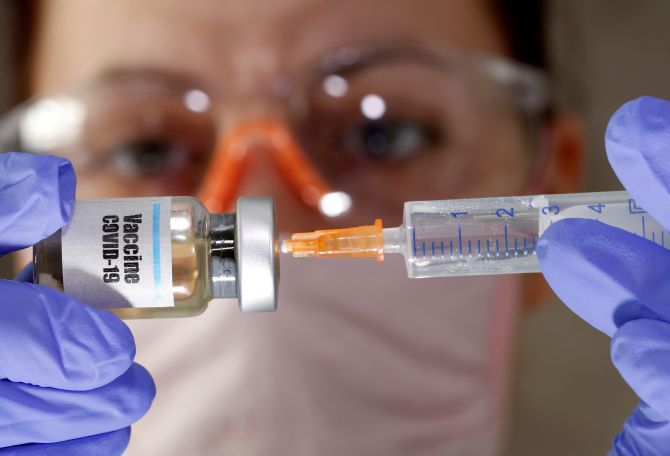The United Kingdom government has signed deals for access to around 90 million doses of promising coronavirus vaccines under development, Business Secretary Alok Sharma announced in London on Monday.
The senior Indian-origin Cabinet minister said the government has agreed significant partnerships with leading pharmaceutical and vaccine companies BioNTech/Pfizer and Valneva that are developing vaccines to protect people against the deadly coronavirus.
“The hunt to find a vaccine is a truly global endeavour and we are doing everything we can to ensure the British public get access to a safe and effective coronavirus vaccine as soon as possible,” Sharma said.
“This new partnership with some of the world’s foremost pharmaceutical and vaccine companies will ensure the UK has the best chance possible of securing a vaccine that protects those most at risk,” he said.
The minister called on the British public to play their part in vaccine research through the new National Health Service vaccine research register.
“By signing up and participating in important clinical studies, together we can speed up the search for a vaccine and end the pandemic sooner,” he said.
As part of a number of pacts, the UK government says it has now secured access to three different types of COVID-19 vaccines that are being developed here and around the world, giving Britain the most likely chance of getting access to a safe and effective vaccine at the “quickest speed”.
It has also secured access to treatments containing COVID-19 neutralising antibodies from AstraZeneca to protect those who cannot receive vaccines, such as cancer and immunocompromised patients.
As a result of these partnerships, England, Scotland, Wales and Northern Ireland could have access to enough doses to vaccinate and protect priority groups identified, such as frontline health and social care workers and those at increased health risk, the Department for Business, Energy and Industrial Strategy said.
Alongside, the new vaccine registry website will allow members of the public to register their interest and be contacted to participate in clinical studies.
To enable large-scale vaccine studies to take place across the UK, the aim is to get 500,000 people signed up by October, which is considered vital in the fight against coronavirus.
Clinical studies with hundreds of thousands of volunteers will help scientists and researchers better understand the effectiveness of each vaccine candidate and will considerably speed up efforts to discover a safe and workable vaccine, BEIS said.
The UK government is also working with ZOE, the health science company using data driven research and behind the popular symptom study app and site, to look at collaborating around vaccine studies and to help their volunteers hear about how to sign up to the NHS registry.
“A safe and effective vaccine is our best hope of defeating coronavirus and returning to life as normal,” UK Health Secretary Matt Hancock said.
“We have some of our best scientists and researchers working on this, but members of the public have a vital role to play too. So I urge everyone who can to back the national effort and sign up to the NHS COVID-19 vaccine research registry to help find a vaccine as soon as possible,” he said.
The latest set of pacts follow an existing global licensing agreement signed with AstraZeneca and the University of Oxford to research, develop and manufacture a COVID-19 vaccine for the UK.
AstraZeneca will work to produce 100 million doses for the UK in total for the vaccine which has shown some promising results in human trials.
Through its new partnership with Valneva, which has a factory in Livingston, Scotland, the UK government is expected to contribute to UK clinical studies costs and is negotiating funding to expand Valneva’s Scottish facility. This increased manufacturing capacity could potentially supply up to 100 million vaccine doses to the UK and internationally.
Kate Bingham, Chair of the UK’s Vaccine Taskforce said: “The Vaccine Taskforce is investing in a diverse portfolio of vaccine candidates to maximise the chances of finding a vaccine quickly that meets the UK’s rigorous regulatory and safety standards.
“The fact that we have so many promising candidates already shows the unprecedented pace at which we are moving. But I urge against being complacent or over optimistic. The fact remains we may never get a vaccine and if we do get one, we have to be prepared that it may not be a vaccine which prevents getting the virus, but rather one that reduces symptoms.”
“Now that there are several promising vaccines on the horizon, we need to call again on the generosity of the public to help find out which potential vaccines are the most effective,” added Professor Chris Whitty, the UK government’s Chief Medical Officer.
As part of a wider 131 million pound investment by the government, support has been given to the Oxford University’s vaccine project as well as one by Imperial College London, which started human studies in June.
The three different vaccine classes that the UK government has secured to date include adenoviral vaccines (Oxford University and AstraZeneca), mRNA vaccines (Imperial College London and BioNTech/Pfizer) and inactivated whole virus vaccines (Valneva).




